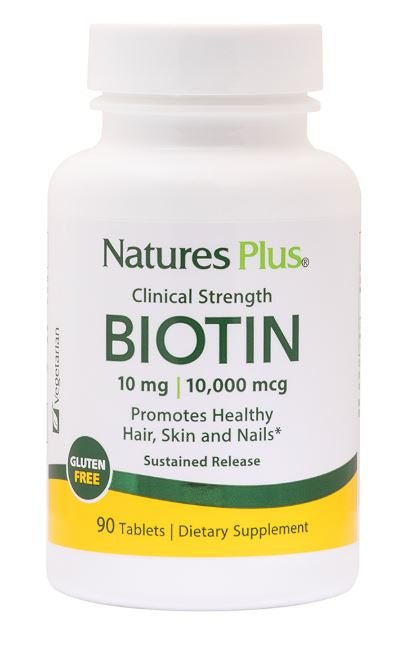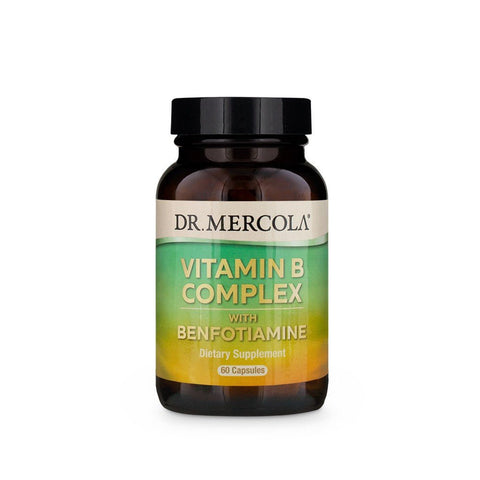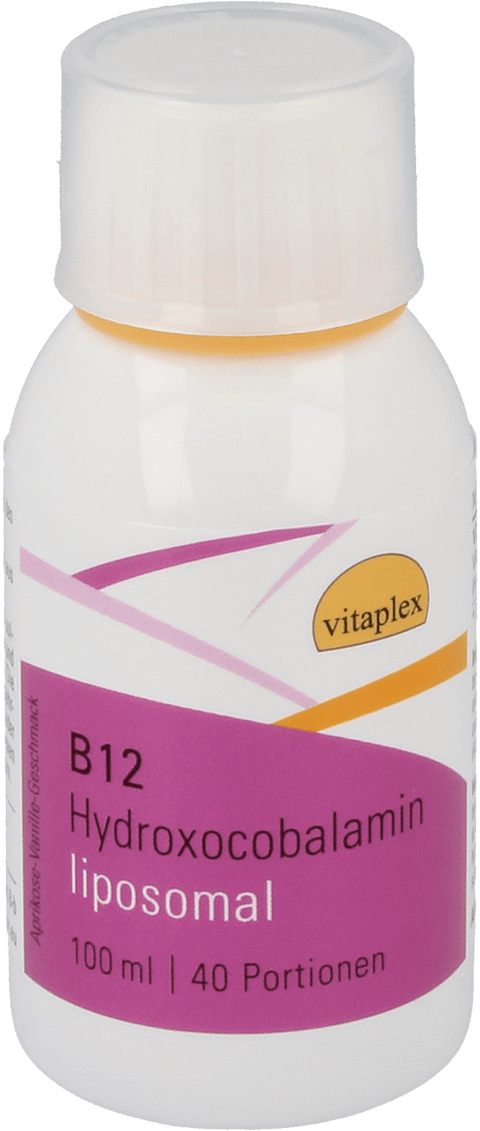8 products
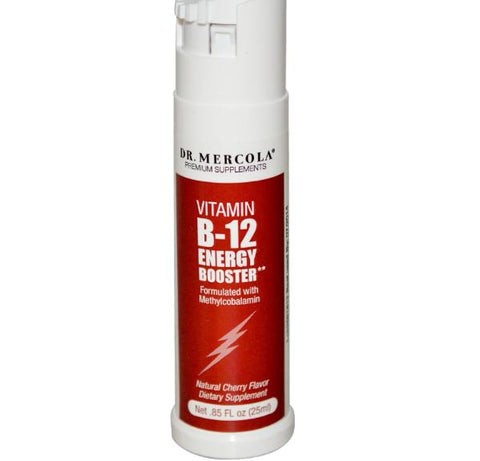
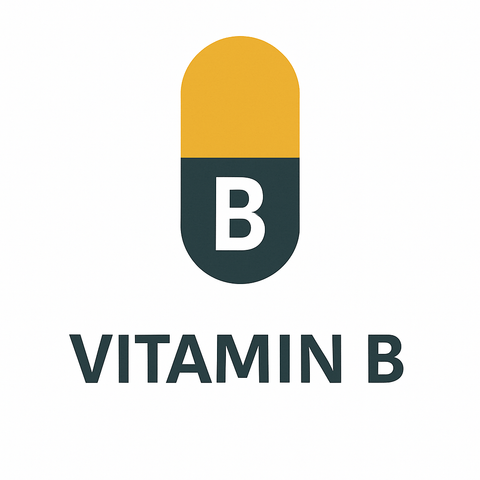
Vitamin B: Essential Support for Energy, Brain Function & Cell Metabolism
🧠 Vitamin B Complex: EFSA-Approved Health Benefits, Sources & Guidelines
📚 Table of Contents
-
EFSA-Approved Health Claims for B Vitamins
-
B1 (Thiamine)
-
B2 (Riboflavin)
-
B3 (Niacin)
-
B5 (Pantothenic Acid)
-
B6 (Pyridoxine)
-
B7 (Biotin)
-
B9 (Folate)
-
B12 (Cobalamin)
-
1. 📖 Introduction
B vitamins are water-soluble micronutrients that perform critical roles in energy production, nervous system function, red blood cell formation, and psychological well-being.
The European Food Safety Authority (EFSA) has approved a wide range of health claims for individual B vitamins, confirming their scientifically substantiated benefits for human health.
This comprehensive guide covers all eight B vitamins, listing their EFSA-backed benefits, dietary sources, recommended intake, and practical tips for optimal health.
2. 🔍 What Is Vitamin B ?
The Vitamin B Complex is a group of eight different water-soluble vitamins, each with unique roles but often working together synergistically:
-
Vitamin B1 (Thiamine)
-
Vitamin B2 (Riboflavin)
-
Vitamin B3 (Niacin)
-
Vitamin B5 (Pantothenic Acid)
-
Vitamin B6 (Pyridoxine)
-
Vitamin B7 (Biotin)
-
Vitamin B9 (Folate or Folic Acid)
-
Vitamin B12 (Cobalamin)
They’re vital for cellular metabolism, neurological function, cardiovascular health, and maintaining healthy skin and hair.
3. ✅ EFSA-Approved Health Claims for B Vitamins
B1 (Thiamine)
EFSA-approved claims:
-
Contributes to normal energy-yielding metabolism
-
Supports normal functioning of the nervous system
-
Contributes to normal psychological function
-
Supports normal heart function
B2 (Riboflavin)
EFSA-authorized benefits:
-
Supports normal energy metabolism
-
Contributes to the normal functioning of the nervous system
-
Helps maintain normal skin and mucous membranes
-
Supports normal red blood cell formation
-
Contributes to the maintenance of normal vision
-
Contributes to the protection of cells from oxidative stress
-
Helps reduce tiredness and fatigue
B3 (Niacin)
EFSA-approved health claims:
-
Contributes to energy metabolism
-
Supports the normal function of the nervous system
-
Contributes to normal psychological function
-
Maintains healthy skin and mucous membranes
-
Reduces fatigue and tiredness
B5 (Pantothenic Acid)
Health claims recognized by EFSA:
-
Contributes to normal synthesis and metabolism of steroid hormones, vitamin D, and neurotransmitters
-
Supports mental performance
-
Helps reduce tiredness and fatigue
-
Contributes to energy metabolism
B6 (Pyridoxine)
EFSA-approved roles:
-
Contributes to cysteine synthesis
-
Supports energy-yielding metabolism
-
Helps reduce tiredness and fatigue
-
Supports normal functioning of the nervous system
-
Contributes to normal psychological function
-
Supports red blood cell formation
-
Regulates hormonal activity
-
Supports immune function
B7 (Biotin)
EFSA-confirmed benefits:
-
Supports macronutrient metabolism
-
Contributes to energy metabolism
-
Supports the nervous system
-
Maintains normal psychological function
-
Contributes to healthy hair, skin, and mucous membranes
B9 (Folate / Folic Acid)
EFSA-authorized claims:
-
Contributes to normal blood formation
-
Supports maternal tissue growth during pregnancy
-
Helps with amino acid synthesis
-
Supports immune function
-
Helps reduce tiredness and fatigue
-
Contributes to normal psychological function
-
Plays a role in cell division
B12 (Cobalamin)
EFSA-approved functions:
-
Supports red blood cell formation
-
Contributes to normal energy metabolism
-
Supports the nervous system
-
Helps with homocysteine metabolism
-
Contributes to psychological function
-
Helps reduce fatigue and tiredness
-
Plays a role in cell division
4. 🥦 Sources of B Vitamins
Natural Dietary Sources
| Vitamin | Food Sources |
|---|---|
| B1 | Whole grains, pork, legumes |
| B2 | Dairy, eggs, lean meats |
| B3 | Poultry, tuna, legumes |
| B5 | Mushrooms, avocados, eggs |
| B6 | Bananas, salmon, potatoes |
| B7 | Eggs, nuts, seeds |
| B9 | Leafy greens, citrus fruits |
| B12 | Liver, fish, dairy (only in animal products) |
Fortified Foods
-
Cereals and bread
-
Nutritional yeast
-
Plant-based milk (often fortified with B12 and B2)
5. 📏 Recommended Daily Intakes (RDA)
| Vitamin | Adults (mg/µg per day) |
|---|---|
| B1 | 1.1–1.2 mg |
| B2 | 1.1–1.3 mg |
| B3 | 14–16 mg |
| B5 | ~5 mg |
| B6 | 1.3–1.7 mg |
| B7 | ~30 µg |
| B9 | 400 µg |
| B12 | 2.4 µg |
Pregnant and lactating women often require higher intakes of B6, B9, and B12.
6. ⚠️ Deficiency Symptoms
| Vitamin | Deficiency Symptoms |
|---|---|
| B1 | Fatigue, irritability, nerve damage (beriberi) |
| B2 | Cracked lips, sore throat, inflammation |
| B3 | Pellagra: dermatitis, diarrhea, dementia |
| B5 | Fatigue, depression, irritability |
| B6 | Confusion, weakened immunity, anemia |
| B7 | Hair loss, skin rash, neurological symptoms |
| B9 | Anemia, neural tube defects (pregnancy) |
| B12 | Fatigue, nerve damage, memory loss |
7. ⚖️ Upper Intake Levels & Safety
Most B vitamins are safe in high doses due to water solubility. Exceptions include:
-
B6: EFSA UL = 25 mg/day (chronic high doses may cause nerve damage)
-
Niacin (B3): May cause flushing at doses >35 mg/day
-
Folate (B9): UL = 1000 µg/day from supplements (not food)
Always consult a doctor before using high-dose supplements.
8. 💊 Supplementation: Guidelines & Use Cases
Who may need B-complex supplements?
-
Vegans/vegetarians (especially B12)
-
Pregnant women (B9 and B6)
-
Elderly (B12 malabsorption)
-
Athletes (higher metabolic demand)
-
Individuals under stress or on restrictive diets
Forms:
-
Tablets, capsules, sublingual drops
-
Methylated versions (methylcobalamin, methylfolate) may be better absorbed
9. 🔗 How to Support B Vitamin Absorption
-
Eat B-rich foods with each meal
-
Avoid alcohol, which impairs absorption
-
Support gut health, as B12 requires intrinsic factor
-
Take water-soluble B supplements with water, not fats
10. ❓ FAQs
Q1: Can you take Vitamin B complex daily?
Yes, daily intake is safe and effective when staying within recommended limits.
Q2: Does Vitamin B give you energy?
EFSA confirms B1, B2, B3, B5, B6, B7, B9, and B12 contribute to normal energy metabolism.
Q3: What is the best time to take B vitamins?
Morning is ideal due to their energizing effects.
Q4: Which B vitamin is best for stress?
B5 and B6 support mental performance and hormonal regulation, per EFSA.
Q5: Is B12 only found in animal products?
Yes—vegans need supplements or fortified foods to meet their needs.
11. ✅ Conclusion
B vitamins are indispensable to human health. EFSA-approved health claims confirm that B1 through B12 support:
-
Energy production
-
Red blood cell formation
-
Mental and psychological performance
-
Immune and nervous system health
-
Skin, hair, and vision maintenance
-
Hormonal balance and DNA synthesis
From leafy greens to fortified foods and supplements, a strategic approach to B vitamin intake supports vitality, cognition, and overall well-being across every life stage.

